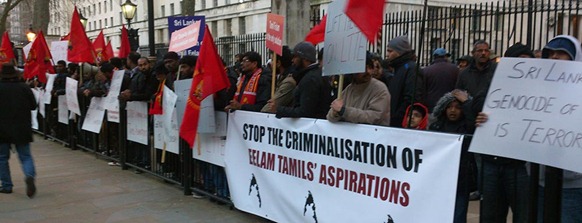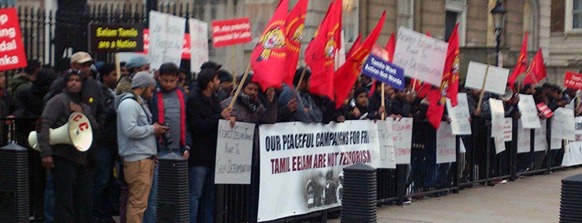Tamil activists in UK gathered at 10 Downing Street, London, on Friday condemning Britain’s lead role in the suppression of independent Tamil political opinion, both before and after Sri Lanka’s genocidal onslaught in 2009. While the UK itself has stated that the LTTE is defunct for the past 5 years, it continues to justify the ban on the Tamil movement, still criminalising all the individuals who were associated with the armed struggle in the past, the protesters said. In the meantime, young Tamil activists who took part in the protest were of the opinion that the fight against the injustice of the past, especially the political struggle against EU ban on the LTTE, an act that enabled the Sri Lankan State to end the peace process in a genocidal onslaught, was a crucial component of the Tamil struggle.

The protest comes as the British government is set to defend its 2006 stance on the act of proscribing the Liberation Tigers of Tamil Eelam (LTTE) at the European Court of Justice on 26 February this year.
The UK would also be arguing against the removal of the LTTE from the list of proscribed organisations as the Sri Lankan Defence Minister Gotabhaya Rajapaksa has been demanding, the activists further said.
“What the ban achieves is the castigation of Tamil political activists as terrorists,” said Tamil youth activist Sathapalan Kanesalingam adding that Britain’s continued criminalization of the Tamil movement only served to support and legitimize the genocidal Sri Lankan state.
The protest was attended by more than 250 Eezham Tamil activists.
Britain is a key international player and it is refusing to concede Sri Lanka’s genocide. The British government is reducing the crime of genocide to just war crimes committed by ‘both sides’, the protesters said. An international investigation should be on genocide and it should be conducted under the legal regime of an international court, they further said.
Colombo government banned the LTTE in 1998 when it launched a big offensive titled ‘Operation Jeyasikurui’ (Operation Victory Assured). But, the Tigers defeated the SL military in the operation that lasted for 2 years, paving way for internationally facilitated talks between the Tamils and the Sri Lankan State.
In 2001, the British government added the LTTE to its list of proscribed organisations, while the Sri Lankan government was under pressure from the Tigers to lift the ban on the movement in order to participate in the Norwegian facilitated peace talks.
The West, using the peace facilitation to bring the Sri Lankan State into its fold, used its ‘carrot and stick’ approach without considering the genocidal outcome. As a result, the SL State was strengthened with the ‘diplomatic carrots’ from the West while the Tamil side was weakened by the sticks of the West.
“There are many sides to this war. Why are you limiting the sides to just two sides,” Mr Sathapalan asked.
The EU ban on the Tigers came in 2006 during the talks when Sri Lankan military Establishment was locking the LTTE into a shadow war.
Colombo banned the LTTE in January 2009 to permanently close the doors for the ceasefire demand. Meanwhie, the West represented by the Co-Chairs was trying to get the Sri Lankan State into its lock by negotiating a ‘surrender’ of the LTTE. The Tigers and the Tamil people were not prepared to accept a surrender to the Colombo government as the act would tantamount to the political capitulation of the Tamil aspiration.

(For updates you can share with your friends, follow TNN on Facebook and Twitter )
